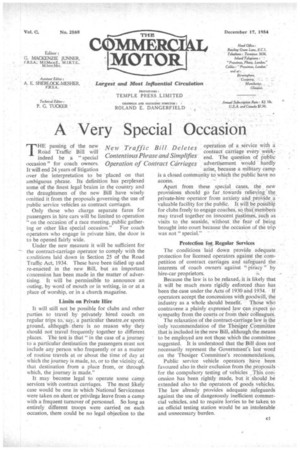Very Special Occasion
Page 39

If you've noticed an error in this article please click here to report it so we can fix it.
THE passing of the new Road Traffic Bill will indeed be a "special occasion" for coach owners. It will end 24 years of litigation over the interpretation to be placed on that ambiguous phrase. Its definition has perplexed some of the finest legal brains in the country and the draughtsmen of the new Bill have wisely omitted it from the proposals governing-the use of public service vehicles as contract carriages.
Only those who charge separate fares for passengers in hire cars ;will be limited to operation "on the occasion of a race meeting, public gathering or other like special occasion." For coach operators who engage in private hire, the door is to be opened fairly wide.
Under the new measure it will be sufficient for the contract-carriage operator to comply with the conditions laid down in Section 25 of the Road Traffic Act, 1934. These have been tidied up and re-enacted in the new Bill, but an important concession has been made in the matter of advertising. It will be permissible to announce an outing, by word of mouth or in writing, in or at a place of worship, or in a church magazine.
Limits on Private Hire It will still not be possible for clubs and other parties to travel by privately hired coach on regular trips to,' say, a particular theatre or sports ground, althqugh: there is no reason why they should not travel frequently together to different places. The test is that "in the case of a journey to a particular destination the passengers must not include any person who frequently or as a matter of routine travels at or about the time of day at which the journey is made, to, or to the vicinity of, that destination from a place from, or through which, the journey is made."
It may become legal to operate some camp services with contract carriages. The most likely case would be one in which National Servicemen were taken on -short or privilege leave from a camp with a frequent turnover of personnel. So long as entirely different troops were carried on each occasion, there could be no legal objection to the New Traffic Bill Deletes operation of a service with a
Contentious Phrase and Simplifies
'end. The question of public Operation of Contract Carriages advertisement would hardly arise, because a military camp is a closed coMmunity to which the public have rio access.
Apart from these special cases, the new provisions should go far towards relieving: the, private-hire operator from anxiety. and ,proVide valuable facility for the public. It will be possible for clubs freely to engage coaches, SO. that mer0e4 may travel together on innocent Pastimes, :such as visits to the seaside, without the featof being brought into court because the occasion of the trip was not "special."
Protection for Regular Services The conditions laid down provide adequate protection for licensed operators against the competition of contract carriages and safeguard the interests of coach owners against "Piracy " by hire-car proprietors.
Because the law is to be relaxed, it is likely that it will be much more rigidly enforced than has been the case under the Acts of 1930 and 1934. If operators accept the concessions with goodwill, the industry as a whole should benefit. Those who contravene a plainly expressed law can expect no sympathy from the courts or from their colleagues.
The relaxation of the Contract-carriage law is the Only recommendation of the Thesiger ,Committee that is included in the new Bill, although the means to be employed are not those which the committee suggested. It is understood that the Bill does not necessarily represent the Government's last word on the Thesiger Committee's recommendations.
Public service vehicle operators haVe _ been favoured also in their exclusion from the proposals for the compulsory testing of vehicles This con cession has been rightly made, but it should be extended also to the operators of goods vehicles. The law already provides adequate safeguards against the use of dangerously inefficient commercial vehicles, and to require lorries to be taken to an official testing station would be an intolerable and unnecessary burden.












































































































